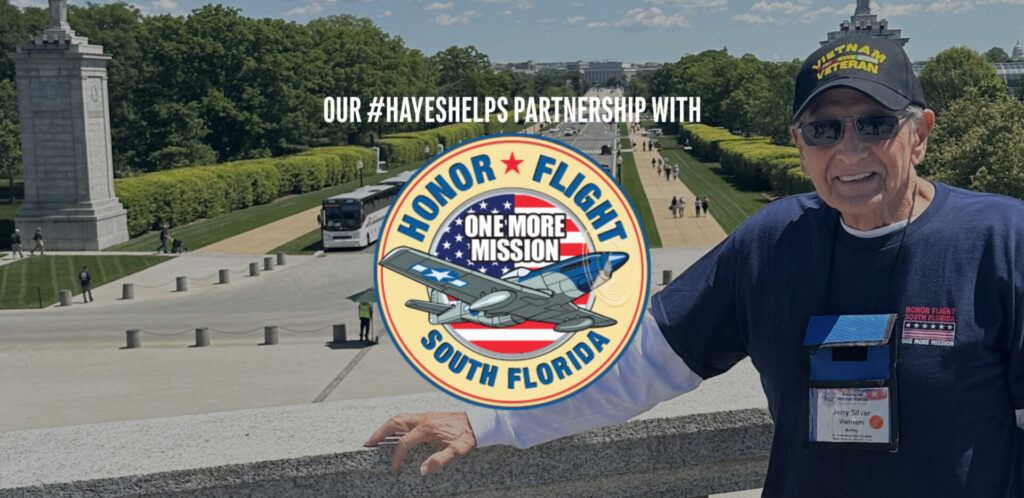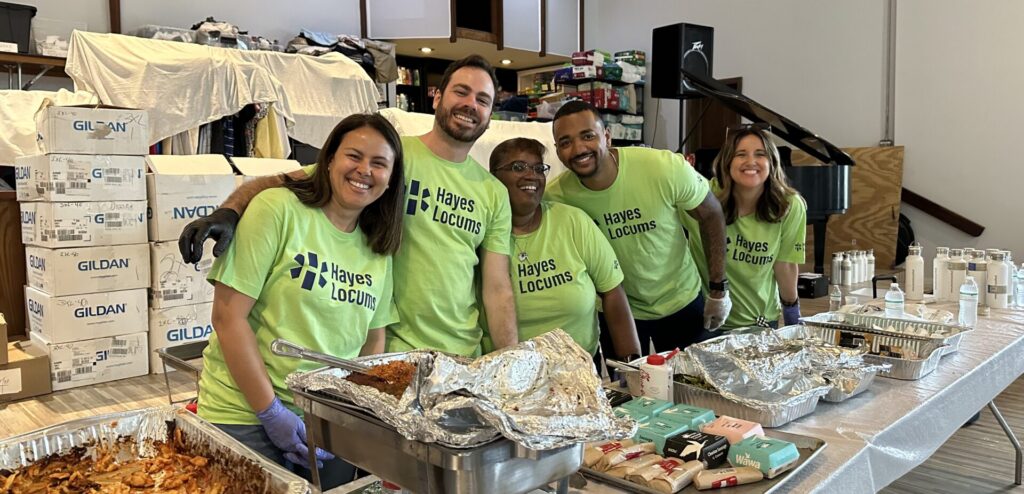One of our most deeply held beliefs at Hayes Locums is that we are at our best when we’re serving others. That’s the mission behind our Hayes Helps program, which gives back to the community by partnering with local nonprofits.
As part of our Hayes Helps program, employees have the opportunity to donate their time by volunteering with organizations like Experience Camps: an national, no-cost program that helps children who have experienced the death of a loved one navigate their grief through compassion, connection, and play. Hayes Locums team members who’ve had the privilege of volunteering as a counselor for Experience Camps have called it a life-changing experience.
Miller Harris, who just completed his second year volunteering as an Experience Camp counselor, is no exception. We interviewed Miller to hear more about what drew him to volunteering, and what keeps him coming back every year.
Here’s what he had to say about his experience:
What made you want to volunteer with Experience Camps?
I volunteered for the first time last year. I had recently lost my father to cancer, and it was incredibly difficult. I love camp, and I like working with kids, so it just seemed like a no brainer to me.
I also imagined I would get a lot out of it myself, which I absolutely did. The entire week is just like one big, safe space where everybody is there for everybody. You’re free to speak and be vulnerable and listen. It drew me in immediately.
I had a great time. Lots of laughs and lots of cries. [After that first year] my kids were like, you better be back here next year! And I told them I absolutely would be. I had the same kids this year as I did last year.
Tell us a little bit more about the camp itself. What does each day look like?
The whole camp is designed to give them a great experience and to just have fun. When you go through a trauma like that, you often have trouble connecting with people. So they try to keep things fun, but also build in thoughtful moments into the program, like sharing sessions where everybody goes around and talks about the loss they’ve dealt with––which for some kid is multiple losses.
The kids who take part in Experience Camps have been through something unimaginable to a lot of people, though it sounds like you can relate to a lot of what they’ve gone through. How did you prepare yourself to be a counselor?
It’s not unimaginable to me because loss is not something that I was unfamiliar with.
But I’ve always found that helping others is the best way to help yourself. In the process of dealing with my own loss, I learned a lot of tools for how to deal with it, and I was excited to be able to share some of those.
But other than bringing a speaker and some candy, I didn’t really prepare myself too much. I just kind of went with the flow. I feel like I was already pretty well prepared, just because of my own experience.
Having that experience to share really allowed me to connect with them on a deeper level. Because oftentimes, if you bring up something tragic in a normal environment like school or work, people just say Oh, I’m so sorry. People sometimes treat you with kid gloves: like you’re always at a wake, and you have to be buttoned up. But in a congregation of people who have all lost somebody, they don’t feel like they’re putting their problems on somebody else, or expecting to be treated as a victim, or brave.
Everybody at Experience Camps is on an even footing, and that’s what makes it work. This is a space where you can talk about and sometimes even laugh about shared pain and share trauma. It’s a good binding force.
What was the most memorable aspect of the experience for you?
There are so many.
We had one kid who is a big fan of musical theater. All the other kids in his bunk are very into sports, in a normal setting and a normal high school they would probably not be in the same clique. But in this situation, they’ve been in the same cabin for five or six years, and they’ve grown together.
Last year, there were just four campers in my cabin, me and my other counselor, and after we turned off the lights, we’d all just talk. And normally the musical theater kid didn’t talk as much–– he usually held back and made space for other people to talk instead. But somehow, it came up that he was the lead of his high school play, and the other kids convinced him to sing for us. It was pitch black, and these other kids, who usually couldn’t stop talking, went completely silent while he sang acapella like an angel. And once he finished––they literally waited for his voice to completely cease––they all went, that was amazing!
This year, we had a talent show, and he got out there and sang very beautifully. His cabin mates passed out flowers for people to throw at the end of the song, so after he was finished, they started throwing Gerber daisies at his feet and then the front couple of rows rushed him and lifted him on their shoulders and started chanting his name.
To see this boy who had been really quiet and stuck in his shell turn into the lord of camp––it was fantastic. I will remember that forever.
The whole experience has given him the tools to put himself out there rather than to be reserved and withheld and disassociated. Now he’s not afraid to get out there at all.
Did going back two years in a row add to the experience for you? It sounds like you were able to plant some seeds the first year and then got to watch them grow a little bit in the second year.
Absolutely.
Do you think you’ll go back next year?
I plan on it! As long as I am mobile and have the means, I will be there.
What do you feel that you’re taking away from the experience?
I honestly feel like I get more out of it than the kids probably do––or at least that the kids recognize, since I have the perspective of age. I get to put myself in their shoes and remember how I either did react or how I might have reacted to what they’re going through. It allowed me to reconnect with what was important to me when I was their age, and what’s important about familial connections.
Also just to be able to share about the person I lost was huge. Talking to strangers is the best therapy because you’ll probably never see him again. People tend to say more than they might to people they know. I get to share my traumas in a way that’s useful to other people.
It reinforces the principle that helping others helps you get outside of yourself. And that even if something bad happens, you can still have a positive effect on somebody at some point.
*This interview has been edited for clarity and length.
We are so proud to be a partner of Experience Camps in their invaluable work of supporting children through grief, and of the amazing volunteer work employees like Miller do to make a difference in their lives.



